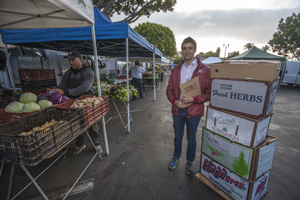
Each Wednesday morning, dozens of local chefs make their way with push carts and trucks to the Santa Monica Farmers Market, where they can buy fresh produce to fill their farm-to-table menus.
Of course, not every chef who wants to serve farm-fresh produce to diners can find time to visit a local farmers market, and even when they do, the fruits and veggies they buy often aren’t enough to last the week.
But the buy-local trend has become so popular among restaurants that it’s prompting startup businesses to cater to the need. In January, Dan Chak, a vegetarian, gardener and software expert, founded Silver Lake food-sourcing company Small Farm Fresh, which connects L.A. restaurants to a network of small farmers through an online ordering service. Chak officially launched his service earlier this month after testing the model for two months with local restaurants.
Four restaurants – Brite Spot and Elf Café in Echo Park, and Farmshop and M.A.K.E. in Santa Monica – already use the service, which gets produce from 30 farmers who deliver the restaurants’ orders to farmers markets in the L.A. area. Couriers then drive the produce from farmers markets to the restaurants.
Chefs who can’t regularly make it to markets usually rely on large food distribution companies, such as L.A. Specialty Produce Co. in Santa Fe Springs or FreshPoint Inc. in Houston, to deliver their supplies.
Jaime Herrera, executive director of the downtown Los Angeles Produce Market Association, whose members include large food distributors, said he can’t imagine Small Farm Fresh will steal much market share from larger distributors that can get produce from around the world when it’s not in season in California.
“No restaurant in their right mind will order 100 percent from a farmers market,” he said. “We know restaurants will come back to us, even if they get 50 or 60 percent of their produce from the farmers market, because when the cold season comes, we fill in the gap.”
Jerry Prendergast, principal at Culver City restaurant consultancy Prendergast & Associates, said he thinks a lot of L.A. restaurants would be interested in using such a service for at least some produce if it proves consistent and prompt.
He noted that bigger distributors can fill restaurant orders on short notice because they keep fruits and vegetables stored in nearby warehouses. Because Chak doesn’t do that, Small Farm Fresh needs more notice.
“That’s going to limit his ability to service most restaurants, because most restaurants don’t know what they want until the day before,” Prendergast said. “I want to be able to order something on Thursday night and have it Friday morning.”
Fresh origins
There’s no doubt that the buy-local food movement has taken off. The Agriculture Department reported that the number of farmers markets has jumped more than 80 percent in five years to more than 7,800. Los Angeles alone boasts more than 220.
Chak said he started the company primarily to help small farmers, who prefer to sell directly to restaurants, but it can be difficult and time consuming to do on their own.
“I want to help them do that distribution,” he said.
Chak, who self-funded Small Farm Fresh, got his bachelor’s and master’s degrees from the Massachusetts Institute of Technology, then worked for a handful of tech startups, including Amazon.com Inc. and CourseAdvisor Inc. Most recently, he worked as vice president of software engineering for downtown L.A. software company Oblong Industries Inc. His idea for Small Farm Fresh stemmed from a personal interest he had in knowing where his food originated.
His business makes money by charging restaurants a premium on top of farmers’ prices, as traditional distributors do. But with Small Farm Fresh, farmers set their prices.
Matthew Kenney Cuisine, which has a culinary academy, a juice bar and the M.A.K.E. restaurant at Santa Monica Place, uses Small Farm Fresh for almost half its produce needs. The rest comes from intermittent in-person trips to farmers markets and a distributor that can get vegetables and fruits – such as pineapple or mango – from thousands of miles away.
Scott Winegard, director of culinary operations at Matthew Kenney, said one thing that keeps him from using the service exclusively is simple: It’s expensive.
“A case of organic lemons from our purveyor is probably $40 cheaper than you can buy from the farmers market,” he said. “When you go through a case of lemons every three days, that stuff adds up and I’m trying to run a business.”
Small Farm Fresh allows restaurants to place daily, weekly, or one-off orders online or through the site’s mobile application. A restaurant buyer can choose which farms he prefers to supply the produce, based on its reputation for quality or price. Once an order is made, farmers receive an email and a text two days in advance of the day the order must be filled. That gives farmers time to pick and pack the appropriate produce before driving to the farmers market. Once the produce arrives, Chak and his hourly employee match the farmers’ contributions to each restaurant’s order. A third-party courier then picks up the produce and delivers it to the restaurant that same morning.
Small Farm Fresh partners with farmers who sell produce at markets in Hollywood, West Hollywood, Silverlake, Santa Monica and Glendale. Chak said he’s working to smooth out a few remaining kinks in the distribution process, but that his ultimate goal is to expand nationwide. In Los Angeles, he’s eager to start delivering to more restaurants, as well as to hospitals, the local school system and green grocers.
“I want to sell to all kinds of institutions,” he said. “I would love to see a return of the neighborhood green grocer. There really aren’t enough of them.”
